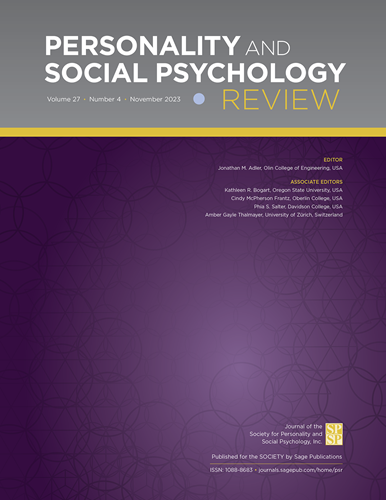人们心中的不平等:经济不平等感知的综合心理学框架。
IF 10.4
1区 心理学
Q1 PSYCHOLOGY, SOCIAL
引用次数: 0
摘要
摘要人们对经济不平等的认知是其政治态度和行为的重要预测因素。社会科学领域的学者们一直在努力理解人们对不平等的(错误)看法。然而,学者们目前缺乏一个共同的框架来整合新兴的发现和概念化这些看法是如何形成的。在这里,我们提出了一个综合框架,以帮助研究人员强调如何感知不平等的心理过程。我们利用知觉、认知、发展和社会心理学的理论来确定不平等感知过程的五个相互关联、迭代的组成部分:(a)获取不平等线索,(b)注意这些线索,(c)理解这些线索,(d)对这些线索的动机处理,以及(e)对不平等的有意义的总结表示。我们的框架为整合不同领域的研究提供了路线图,使当前的发现有意义,并确定新的挑战,以推进未来的研究。人们对不平等的认知程度比官方衡量不平等的方法(如基尼系数等经济指标)更能预测他们的政治行为。虽然社会科学领域的学者们正在努力理解这些对不平等的(错误)看法,但文献缺乏对不平等看法的测量,因此,人们是否低估或高估了不平等。通过提供不平等认知的综合心理学框架,重点关注人们如何形成这些认知的过程,以及这些认知对他们意味着什么,我们揭示了人们何时以及为什么会感受到或多或少的不平等。我们的框架概述了不平等观念背后的心理过程,并帮助学者重视人们自己的观念为解决社区不平等问题提供的信息和洞察力。本文章由计算机程序翻译,如有差异,请以英文原文为准。
Inequality in People's Minds: An Integrative Psychological Framework of Perceptions of Economic Inequality.
Academic AbstractPeople's perceptions of economic inequality are important predictors of their political attitudes and behaviors. Scholars across the social sciences have worked to understand people's (mis)perceptions of inequality. Yet, scholars currently lack a common framework for integrating emerging findings and conceptualizing how these perceptions are formed. Here, we propose an integrative framework to help researchers highlight the psychological processes underlying how inequality is perceived. We draw on theories of perception, cognition, developmental, and social psychology to identify five interlinked, iterative components of the inequality perception process: (a) access to inequality cues, (b) attention to these cues, (c) comprehension of these cues, (d) motivated processing of these cues, and (e) meaningful summary representation of inequality. Our framework provides a roadmap for integrating research across disparate fields, making sense of current findings, and identifying novel challenges to advance future research.Public AbstractHow much inequality people perceive better predicts their political action than do official measures of inequality (e.g., economic indicators like the Gini coefficient). While scholars across the social sciences are working to understand these (mis)perceptions of inequality, the literature lacks agreement on measurements of inequality perceptions and, as a result, on whether people under or overestimate inequality. By providing an integrative psychological framework for inequality perceptions that focuses on the processes underlying how people form these perceptions and what they mean to them we shed light on when and why people perceive more or less inequality. Our framework outlines the psychological processes underlying perceptions of inequality and helps scholars value the information and insight people's own perceptions provide for addressing inequality in communities.
求助全文
通过发布文献求助,成功后即可免费获取论文全文。
去求助
来源期刊

Personality and Social Psychology Review
PSYCHOLOGY, SOCIAL-
CiteScore
19.00
自引率
1.90%
发文量
20
期刊介绍:
Title: Personality and Social Psychology Review (PSPR)
Journal Overview:
Official journal of SPSP, the Society for Personality and Social Psychology, Inc.
Premiere outlet for original theoretical papers and conceptual review articles in all areas of personality and social psychology
Features stimulating conceptual pieces identifying new research directions and comprehensive review papers providing integrative frameworks for existing theory and research programs
Topics Covered:
Attitudes and Social Cognition: Examines the inner workings of the human mind in understanding, evaluating, and responding to the social environment
Interpersonal and Group Processes: Explores patterns of interaction and interdependence characterizing everyday human functioning
Intergroup Relations: Investigates determinants of prejudice, conflict, cooperation, and harmonious relationships between social groups
Personality and Individual Differences: Focuses on causes, assessment, structures, and processes giving rise to human variation
Biological and Cultural Influences: Studies the biological and cultural mediation of social psychological and personality processes
 求助内容:
求助内容: 应助结果提醒方式:
应助结果提醒方式:


